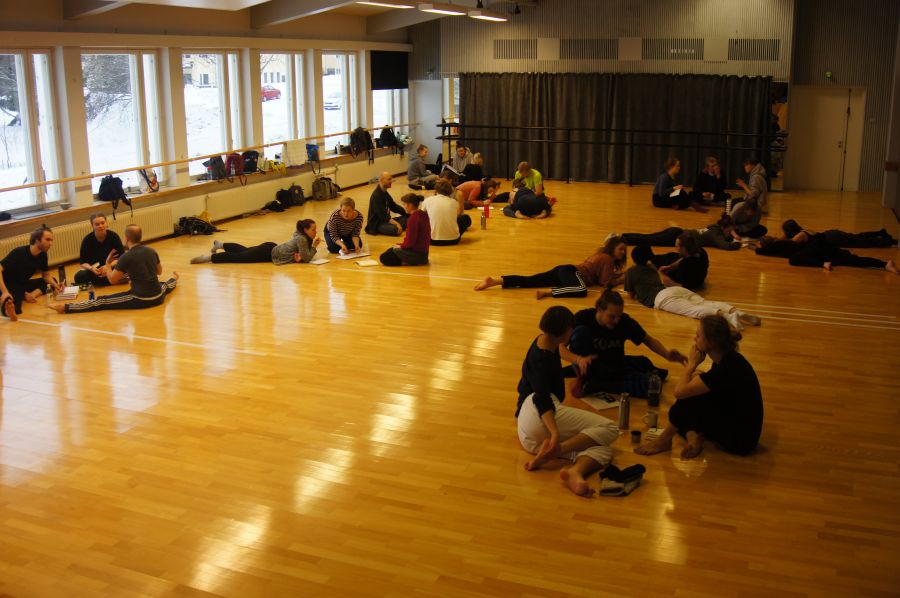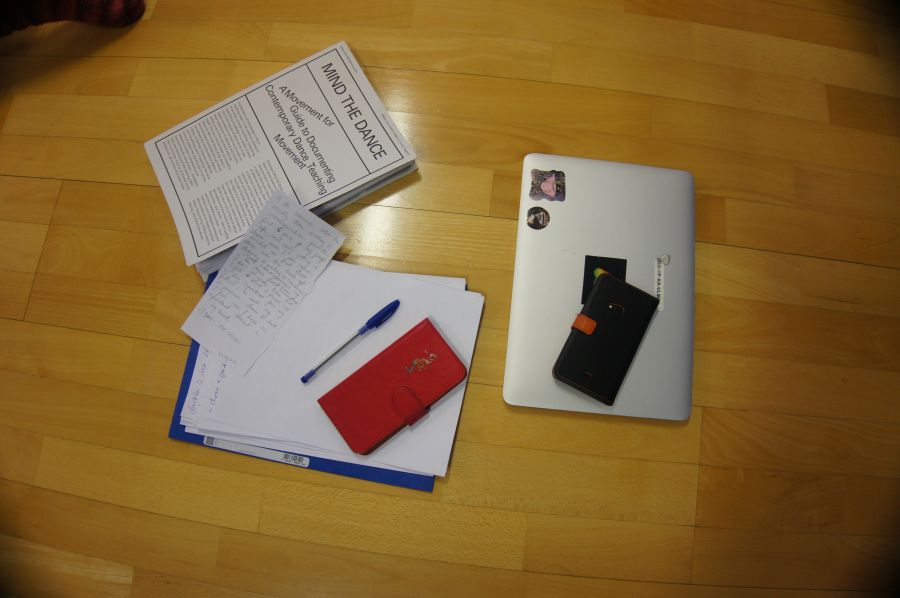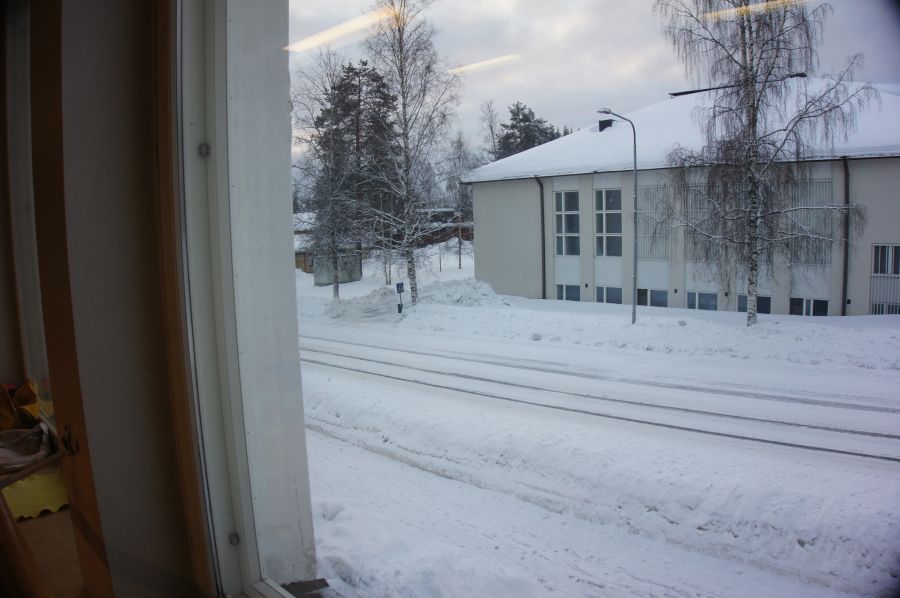IDOC Type:
In Folders:
Eszter Gal & Ulla Mäkinen// MTD Laboratory TransForming
Collection of texts, files, images, video of the MTD Lab - 29-30. January, 2018
See the schedule and plan for the lab here.
Day 1 - Notes from the sharing of the experince of the class and on the first discussion about documenting a dance class. Notes were taken by the participants, in a common word document, passing around it. It is copied here without editing.
- Accumulation, idea on top of idea, easy transition between qualities, advices together with imagination
- Seeing the outside and feeling the inside, chancing between them
- ”Body is the eye”, seeing through the body not only the eyes
- when getting tired i focused on the eyes again and it gave me movement
- i was not feeling tired, because i was not me – i trascented to another place
- Eye thing wasn’t about the eyes and seeing, it was about the back of the head and feeling the space
- Some animals have eyes on the sides of their head
- If I have 360 vision I dont have to looke anywhere because i can see anything anyway
- What is difference from documenting assignment or my personal experience
- Seeing your whole body without eyes, is the limit only your own body
- Big eyes made the analytical mind quiet down
- Task left in space for long time à space for exploration and own interest
- Repeating improvisation, does it become boring? Not trying to be interesting rather than be interested. How to find your curiosity.
- Familiar task, so am I doing something else in a broad assignment go deeper?
- Not doing the task for the teacher, but doing it for the content
- Myös keho ja mieli näkee ja katsoo
- What is sameness?
- Finding contact with the body rather than eyes and seeing with the body
- Itś not only about what the teacher is saying, but also how she/he is sharing the space. How the way of teaching affects the learning process? Can also the teacher take different roles while the process?
- Layers of cheese: there are holes in the cheese so you have the space to keep working on what is important to you
- Being held can be the same as having freedom
Day 2 - Notes from a facititated discussion that followed a morning practice.
Reflection // group1
2 experiences out of the class - first the body experience, ”documenting with the body” and then listening to the interpreter of a solo dance. See PDF - material and notes of day 2.
- Linda says dance is not words. The dance is not coming to me through the words. I cant reach the dance through the words. But all the interpretations are revealing something and hiding something. Can I reach the dance through my interpretations?
- Feeds imagination. Refreshing.
- ”I was not able to see the dance, but I was able to imagine a dance”
- Images are building a more whole picture, but it might be totally different.
- ”I tried to verbalize it without using images, to extend my vocabulary”
- There is a technique for telling blind people of art piece or performance.
- When someone is describing something for you, you get an idea about their way of seeing thing. Seeing things in a bigger perspective, how does one percive world.
- Question about honesty. ”telling truth?”
- Who is our audience when we document?
- Listening someone’s else interpretations was the art, a piece itself. It was not only a subscription.
- Movement materialized in words. Listening to that was the most interesting part.
- What kind of perspective you get? What do you chose to tell (for example movement analyse or imagine, both?) What is worth documenting?
- Documentation is reflection. And a translation process. questioning: how to translate something for someone else to understand.
- Documenting through touch
- You can choose your own perspective while documenting, but other people interpret it (anyway) on their own way.
- It’s impossible to say everything. Is it needful to try to be excat? Choice making of deciding what to tell and show through speaking or through showing pictures.
- I’m not able to catch everything when documenting. In the same way: when I’m not maybe able to understand everything when I’m watching an art piece.
- Documentation/art/dance is creating a dialogue.
- How can I give space for interpretation for the audience?
- Describing the movement and interpretating the face expression...
*read the class materials in the PDF
Reflection // group 2
- jo kosketus voi olla dokumentaatio; mitä dokumentoimme kehoomme?
- kehomme on elävä kirjasto
- informaatiotulva, mihin kiinnittää huomion ja mihin tarttuu? Mikä nousee esille ja mikä jää?
- Då jag berättade åt den personen med ögonen stängda så märkte jag att jag upprepade mig själv mycket, men om personen som improviserar också upprepar sig själv så behöver jag hitta på nya ord eller förklaringar varenda gång?
- selostamisen kuulemisen vaikutus omaan tekemiseen, hakeutuminen pois kuuloetäisyydeltä
- kokemus välittömästä palautteesta omasta liikkeestä
- ohitetaan tietoinen mieli, editoiva mieli. Haastetaan kriittistä mieltä. Autenttinen puhe.
- Tässä huijattiin puhumaan kahdeksan minuuttia, joka ei aina muuten olisi helppoa.
- dokumentointi omasta dokumentoinnista
- kuka on sun yleisö? Miksi dokumentoimme? Oman praktiikan syventäminen ja kehittäminen, meidän marginaalinen alamme josta kirjoitetaan hirveen vähän verrattuna muihin taidealoihin. Me tarvimme dokumentointia ulostulemiseen ja alamme tunnettavuuden laajentaamiseen. Kehitetään alan pedagogiikkaa.
- Millä tavoin jaat/dokumentoit? Onko asiat henkilökohtaisia vai helppo jakaa? Yksityinen vs julkinen dokumentointi?
- Mikä ero toisen kuvaamalla ja itsensä kuvaamalla materiaalilla, mikä ero live-esiintymisellä ja videotaltioinnin julkaisemisella? Onko toinen helpompi lähestyä ja miksi? Miksi toinen dokumentointi on henkilökohtaisempi kuin toinen (video vs. teksti)?
- Suhde häpeään kaikessa tuottamassaan materiaalissa
- Se ei riitä, että jäät omaan himaan hyppimään
- miksi se, että minua kuvaa joku ulkopuolinen tuntuu erilaiselta, helpommalta, kuin se, että kuvaan itse itseäni
- Oman alan kehittäminen, dokumentaation tavat, pitääkö se jakaa, mies joka seurasi luontoa vuosia erakkona, nyt hänen dokumentaatio on tärkeää, koska ilmastonmuutos.
- Mihin kiinnostuu, päättää dokumentoida, miten sen tekee. Tietääkö onko dokumentaatio hyödyllistä tehdessä, hyöty voi paljastua myöhemmin
- Dokumentaation sattumanvaraisuus, luonnoksien merkitys, ”turhat” muistiinpanot hyödyllisisä tuleville sukupolville
Click a link to view the document in a new window (PDF supporting browsers only)
Right click on the link(s) and choose "download linked file as", to specify the target download folder on your computer




















